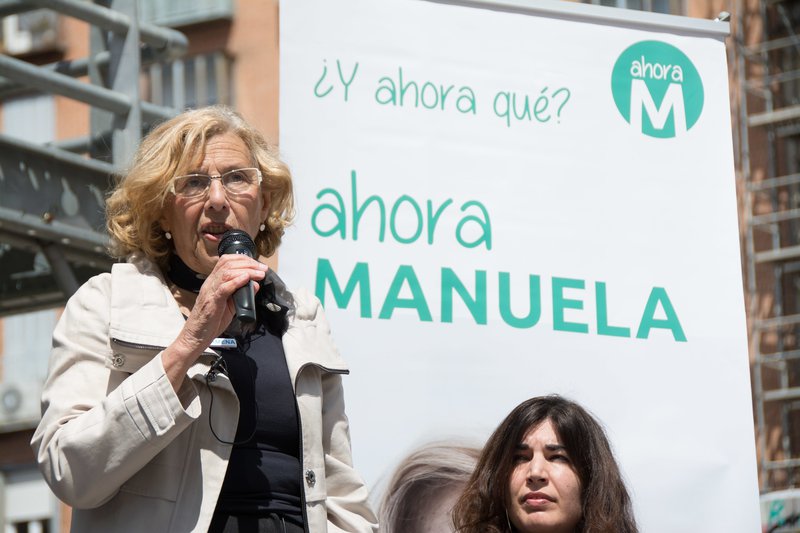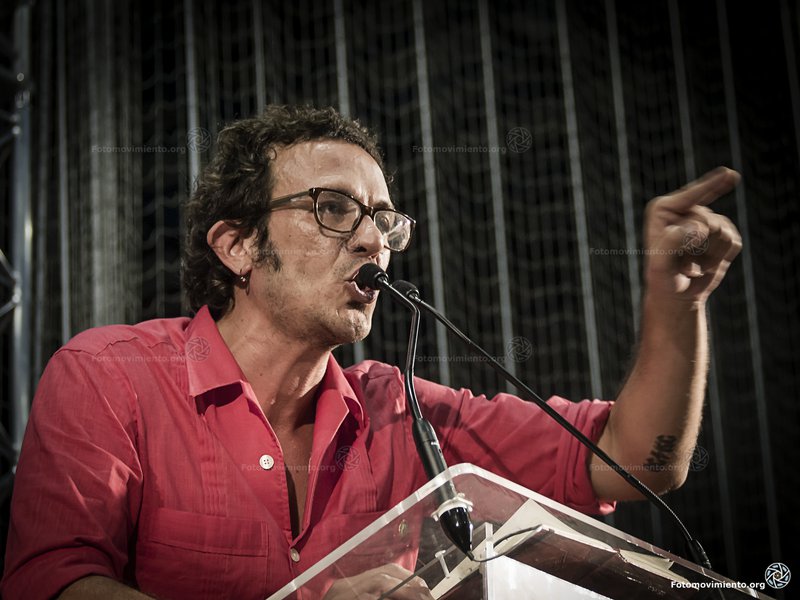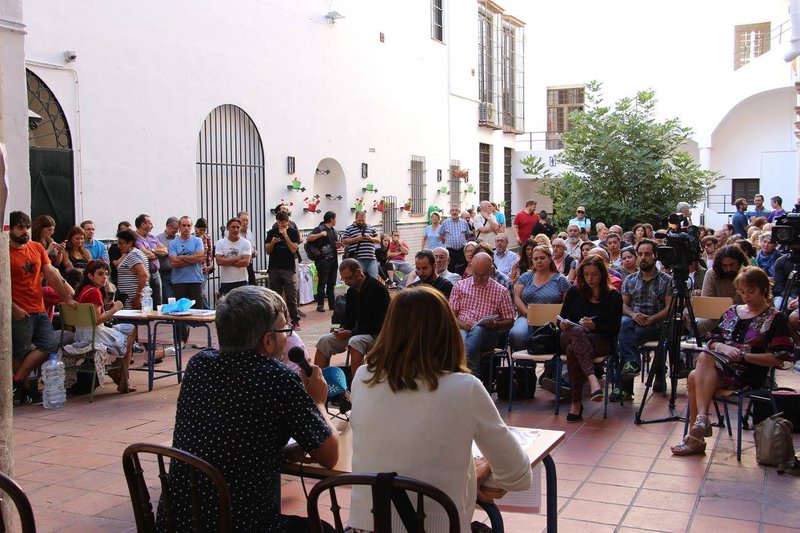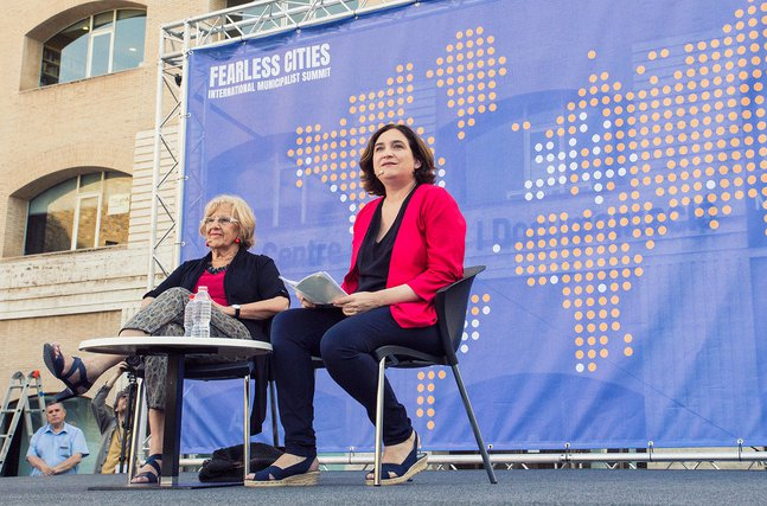As the European Elections unfolded last week, many activists and progressive forces around the world paid particular attention to the municipal elections taking place at the same time in Spain. For years, Spain has been a beacon for the possibilities of progressive change at the municipal level. This explains the shock that came with reading headlines or tweets announcing the electoral defeats of political projects built around a new form of municipalism. The defeat of these political projects, known as Fearless Cities or Cities of Change, was particularly painful in Madrid, and in Barcelona, where Barcelona en Comú had put a lot of effort in building an international movement and network of Fearless Cities.
However, this defeat is mainly a perception for now, as the tight results mean that complex negotiations will happen, where the new municipalists will have a strong voice, even with possibilities to keep the mayor’s office, albeit with less power than four years ago.
Still, in light of these developments, we need to ask: what went wrong with the municipalist project in Spain? This text aims to give some insight into these electoral results. It attempts to unpack what happened in Spain for those aiming to better understand the context, and to draw some lessons for their own similar, or comparable projects.
The three souls of the new municipalist projects
The new municipalist platforms that came to power in 2015 resulted in one of the more remarkable political successes of the “left” forces of the last decade. This was achieved right when Podemos as a political party was on the rise in Spain, Syriza was at the height of its influence in the midst of the negotiations with the Troika to end austerity in Greece, and social democratic parties were in free-fall in the EU. Their success was presented by Podemos as the first stage of a major assault on state-level power. However, that picture was not completely accurate. Podemos had a strong influence in the constitution of the municipalist projects, but the new municipalists were much more than that.
There are a few good texts about what elements define the new municipalist practices, particularly from the Barcelona en Comú perspective. However, in this text I propose an alternative angle to understand their success and their apparent defeat last week. I argue that we must focus on which forces made a victorious dynamic possible under the umbrella of the new municipalism in record time. Only then can we better understand last week’s outcomes.
The new muncipalist projects enabled the convergence of three main groups: first, traditional “left” forces – understood as mainly Izquierda Unida (IU) and the old Communist party; second, grassroots activist veterans of the anti-globalisation movements of the 2000s, hardened by the massive mobilisations and action as part of the anti-austerity 15M ; and third, the mass of unmotivated social democratic voters that were looking for a left and progressive alternative to the status quo in the aftermath of the Troika-driven policies. The first two were the core organizers of the new municipalist movement, with various degrees of influence depending on the municipality. The latter was an important mass of voters whose influence would be decisive in the elections. When these three souls were dancing together, a process of “desborde” (overflow) would unfold, meaning that the political campaign would escape the control of its protagonists, and be appropriated by the general public who would in turn re-shape it to their own image and wishes. A comparable process happened with the Mayoral Campaign of Manuela Carmena in 2015.
One of the most important theoretical and dialectical debates within Podemos the last years has been to what extent the political project had to build a discourse closer to one of these three groups. One of the main reasons behind the current crisis facing Podemos has been an inability to articulate itself around all three consistently. There were passionate and deep differences of opinion among the most politicised sectors of the party, and the tendency to make these tensions public exacerbated the internal crisis. For those looking in from the outside, the debates were confusing. This was used strategically by the party’s opponents, and likely contributed to the loss of support. The new municipalist projects, thanks to their focus on local politics and day-to-day problems instead of grandiose debates about political theory, were best suited to face these tensions. As we will see, those places that were able to hold the “three souls” together have been the most successful ones.
What happened?
The best way to sketch the current landscape is to look a bit closer at each of the most paradigmatic cases.
Barcelona and its mayor Ada Colau have deservedly garnered most of the attention globally. Barcelona en comú developed a solid campaign. Its project included all three souls. It included the traditional left and Podemos – with Pablo Iglesias joining the campaign. It incorporated grassroots activists, who brought enormous imagination, and PR successes like public support for Colau from Bernie Sanders and Naomi Klein among others.
The movement deployed a successful political message centred on how to make the city a better place for all, and a process of desborde, which attracted many social democratic voters and others, unfolded. Last week’s outcome only appears to be a defeat because out of a total of 756,000 they got 4833 less votes than, and the same number of city councilors (10 each of a total of 41) as, their main rival, the Republican Independent Left (ERC). The ERC was the only rival capable of getting more votes in the city, and for very particular reasons. The ERC based its campaign on attacking Colau, and on the need for a capital for an eventual Catalan republic. The imprisonment of their leadership in Madrid as a consequence of the push for independence only dramatized their message. Nevertheless, at the time of writing, Barcelona en Comú is calling to form a government together with the ERC and the social democrats.
Madrid is a complex story. Here the defeat is also only relative. Manuela Carmena´s party, Mas Madrid, has obtained 19 out of 57 council seats and 31% of the vote. Her party’s main rival, Partido Popular, garnered 15 council seats and 21% of the vote. Carmena’s mayorship is in trouble only in the case of a tenuous alliance between the conservative right and the liberal right who are ready to form a pact with the new far right party Vox. An alliance of this kind would be unthinkable in France or Germany, but not in Spain. However, the division of the three souls explains why Madrid is in this situation.

Manuela Carmena (Madrid) campaigning in 2015 | CC BY 2.0
Carmena came to power with Ahora Madrid, the new municipalist platform that in 2015 gathered the three souls of the movement. However, an internal split with the grassroots activists and traditional left, who for instance advocated a default on the huge public debt of the city, led Carmena (a former judge and vocal against institutional disobedience) to create her own municipalist group under her direct control – Mas Madrid. IU Madrid, Anti-capitalist Madrid and a number of the grass roots municipalists created their own party outside Mas Madrid, Madrid en Pie Municipalista. To make things more complicated, regional elections in Madrid were conducted at the same time, exacerbating the internal crisis of Podemos as regional, local and national allegiances were tested to their limits. The perceived infighting and bickering undermined momentum.
In sum, a cohesive municipalist project uniting the three souls was not possible in Madrid. Some would call it the typical division characteristic of the left, but here the issue is not about a mere aggregation of the votes of the different groups, since they would be enough to form a majority. The problem here is that when there is no synergy among the “three souls” the dynamics of desborde (overflow) do not happen. This translates into passivity on the part of a significant number of people. When you feel you are part of the something big and open, you go the extra mile to make another call, another meeting, another meme, the next tweet, a drawing that captures the feeling of your neighborhood, as was the case in 2015. These small bites do make a difference, especially in left and progressive groups who vote based more on conviction and ideals, than those on the other side of the spectrum. Lack of motivation can explain how the poorest neighborhoods of Madrid had less participation this time, while the richest ones did mobilize and made a difference by voting for one of the three right wing candidates.
Cadiz is the only relevant municipality with a municipalist candidate that has kept its leading position, even winning more seats. Its representation grew from eight to 13, of a total of 27. Four years ago, the charismatic leader José Maria Santos, known by all as Kichi, was the only one from the new municipalist platforms that came directly from the Podemos rank-and-file, although from the Anti-capitalist arm and not the “central” headquarters. The leadership of Kichi has been able to keep the three souls of the municipalist project together, under the flag of Adelante, the brand of Podemos in Andalucia under the control of the Anti-capitalists. Cadiz was the “poor” southern cousin of the municipalist projects, with an inheritance of huge debt from the previous mayors, and much smaller capacity to address it. Kichi´s management reduced Cadiz´s debt with suppliers from 265 to 44 million Euros, and average payment occurs now in 30 days instead of 130. These changes might seem small from a broader revolutionary perspective, but they do change people’s lives, especially small businesses that depend on their deals with the administration. Kichi has consistently defended the need to remain humble and close to the people. He was at the center of the heated debate within Podemos after Iglesias bought a villa worth 600.000 euros. In the midst of the media scandal that unfolded, (exacerbated also by the many opponents of Podemos), Kichi wrote a letter expressing that “the ethical code (of Podemos) is a guarantee to live like the common people”.
 Kichi, mayor of Cadiz | CC BY-NC-ND 2.0
Kichi, mayor of Cadiz | CC BY-NC-ND 2.0
Zaragoza. The new municipalist platform that was created in 2015, Zaragoza en Común has plummeted from nine to three out of 31 council seats. Here, the main reason is that Podemos and IU presented a different platform than Zaragoza en Común, obtaining two councilors. Social democrats grew substantially, capitalizing on the charisma of the new President of Spain, Pedro Sanchez. Unfortunately, similar to Madrid, an anticipated pact amongst the three right-wing parties would mean the end of a progressive mayor in the city.
Valencia was a special case because Compromís, an older party, holds office. Compromís is a left progressive party from the Valencia region with a nationalist character although not pro-independence. Before the creation of Podemos and the new municipalism, Compromis was the main voice against corruption in the institutions run by the governing Popular Party. Compromis’ leader, Monica Oltra, was expelled from the Regional Parliament on several occasions, due to her interventions about the corruption scandals there. These interventions made her very popular. The new municipalist platform Valencia en Comú, with three councilors out of 33, together with the support of the social democrats, was key to giving Compromís the mayor´s office in 2015. Valencia en Comú decided to disappear and join Podemos and IU this time round, but they did not get enough votes for a council seat this time. However, Compromis keeps the mayor´s office due to higher support and its alliance with the social democrats. Despite its different nature, Compromís has employed strategies and tactics that municipalist projects have used elsewhere; like reducing its debt by half, reducing the number of cars in the city, welcoming refugee ships, and increasing social spending. Compromís Municipal will govern for four more years.
Have these projects been transformative?
We can define transformation as the process of a cocoon becoming a butterfly; this is a process that cannot be reversed. After learning the election results Ada Colau declared that they had “broadened the horizon of what is possible”. Indeed, the seed of the new municipalist projects will continue to grow. Amsterdam plans a Fearless Cities Conference in 2020, Belgrade will host one in a few days.
 Municipalities for Change gathering, 2015 | CC BY 2.0
Municipalities for Change gathering, 2015 | CC BY 2.0
Cities are slowly gathering more power and influence. A week before the latest G20 in Buenos Aires, for instance, the first Urban20 gathered. There, the leaders of the 25 largest and most influential cities came together to put city agendas on the global map. Cities are demonstrating that they are capable of raising the minimum wage, reducing emissions or enforcing more accountable business practices on firms like AirbnB and Uber, even better than states. This dynamic can only grow. Colau’s administration in Barcelona created the biggest public energy utility of Spain, focusing on renewable energy. It is hard to imagine that a future administration would try to undo this. Carmena has reduced the debt of Madrid by almost half, a staggering 2.14 billion Euros. Similar dynamics happened in many other new municipalist governments. This puts paid to the myth that left and progressive administrations hurt the economy, or that they create debt that efficient right-wing administrations then have to solve. The inverse has been proven. If others after them create new debts, the population will take note. The last financial crisis ensured that voters know how dangerous debt is.
The results of Spain’s municipal elections were not what progressives around the world expected. We must wait and see how the political field will reconfigure itself, an open process at the time of writing, in Barcelona and Madrid. We must, however, examine the details so that we can draw the lessons needed to expand progressive political influence at the local level in a way that can tackle global issues such as unaccountable financial power and global warming. We live in a moment of crisis and opportunity, and the Spanish experience shows that it is possible to incorporate veteran left parties, grass roots activists and disfranchised social democratic and progressive voters into broader transformative processes. How to do that sustainably will depend enormously on the local context, and it is the task of the new municipalists to create the tools and narratives to accomplish it.
Do not forget that ¡Si se puede! It is possible!





